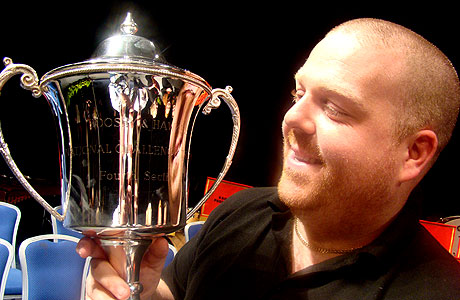
Looking good: M2 MD, Dewi Griffths and National Trophy...
There was something historically appropriate that a band from Wales was crowned Fourth Section champion on Saturday afternoon.
Henry V was born in Monmouth, and whilst he certainly couldn’t be described as a ‘valley’s boy’, he did rely on the locals to provide the majority of his airborne ammunition in bashing the French at Agincourt.
Too severe
That said, he almost gave his own troops one heck of a beating on the Centaur stage battlefield in Cheltenham too.
The celebratory Ralph Vaughan Williams overture proved too severe test for the 19 competing bands – the top six finishers and winners included.
Responsible
And whilst a number of conductors did commit musical suicide, especially with some of the tempos chosen, the responsibility for what came perilously close to a contest of meaninglessness lay squarely with the Music Panel: They got this selection badly wrong.
The harsh lessons learnt from the final in Harrogate on ‘The Shipbuilders’ just three years ago had seemingly been forgotten.
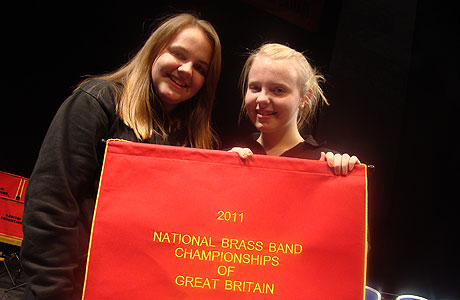
Banner girls: Two delighted members of the winning band M2
Standards at Fourth Section level have not improved since 2008 – and have perhaps even gone backwards:
From the much more appropriate ‘Prelude, Song & Dance’ at the Areas to ‘Henry V’ at Cheltenham was a musical step too far even for the best bands on the day.
It was a very harsh reality check: Saturday’s Agincourt battlefield was littered with the corpses of brave contenders killed off by a set work that made too many stringent demands.
Difficult job
As a result Stan Lippeatt and Barry Thompson were left with an extremely difficult job in the box.
They had to compare and contrast a host of flawed renditions, full of basic ensemble and individual problems caused by a test that extended abilities to the very limit – and beyond.
Compact and colourful
In the end they opted for a compact, colourful rendition from Melingriffith 2, conducted by the impressive Dewi Griffiths, with a highly enjoyable, if slightly flawed account from New Forest Brass, directed by Ian Luxford in second, and Rushden’s early marker that grew in confidence under Martin Dawson in third.
Two solid performances from Ramsay Town and Boarshurst Silver, directed by Robert Quance and David Ashworth respectively, took fourth and fifth, with a musical interpretation from Dinnington Colliery in sixth.
All six prize winners left the stage having given their very best, but also looking as if they had not particularly enjoyed the experience.
Other bands looked brow beaten.
At this level, competing at the National Final should be an occasion to savour not endured: The MDs worked their socks off, the player’s give it their all.
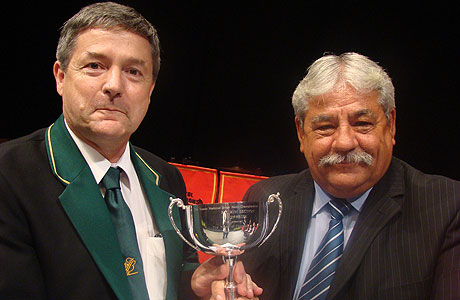
Forestry commission: Second place for New Forest Brass
Eyebrows raised
A few eyebrows were raised at the result, with two strongly fancied performances from Dronfield and Besses Boys ending in 9th and 11th respectively, whilst the award of the ‘Best Instrumentalist’ prize to soprano player Aled Jones-Pritchard of Melingriffith 2 caused a few grumbles.
He certainly played all the main solo lines and exposed parts in full throughout, and with a bold, bright confident tonality, but he was given a helping hand on some of the higher work by his bumper up, Ian Porthouse.
Having the former Black Dyke principal cornet wasn’t the reason why the Welsh band won though.
All had moments
Theirs was a performance that caught the mood and atmosphere of the unfolding drama, with well balanced ensemble lines producing warm, dark tonality in much the same way the judges felt came from New Forest (who really were a band of confident performers), and to a lesser extent from the remaining top six finishers.
All had their moments, but in the opinion of Stan and Barry, none were able to quite match the sense of security displayed by the top two bands in particular.
Plus and minus
Outside the top six it was a question of weighing up the plus points against the minus ones, with personal preference deciding the fates.
There was for instance little to choose between Harwich RBL in seventh to Burbage (Buxton) in 14th.
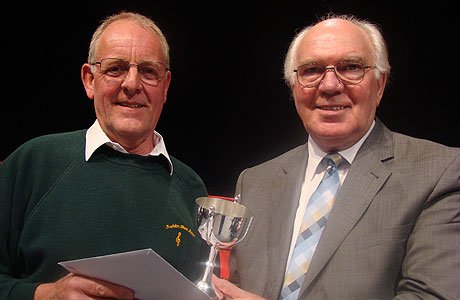
Rushden claim the final podium place
Arguments
Dronfield and Besses may feel a little hard done by, but there were persuasive arguments to be made for higher or lower placings for Ireland Colliery, MacTaggart Scott Loanhead, NASUWT Riverside Concert and LGB Brass.
On another day they could well have been reversed.
The bands in the bottom quarter did struggle, but battled to the very last note to deliver performances of great merit.
It was not the fault of Bratton, Golborne, Hatherleigh, Kingsway Printers Cleethorpes or Abertillery that they were pitched against a test piece more suited to the Second Section.
Gallic hara-kiri
That said, quite a few MDs did commit a 15th century version of Gallic inspired hara-kiri – especially with the tempos of the French call to arms and final march, which at times were played at a speed that made you wonder if the troops were on double time wages.
The judges were sympathetic to the plight of the bands on the day – Stan in particular talking of them ‘making a good fist of it’.
However, it was a musical fist that punched too many on the nose and bled their chances dry of making any sort of impression on the results table.
Triage
As a result, MDs were left with trying to cope with a musical triage system.
Those players who could cope were invariably left to their own devices (and there were plenty of examples of both young and old rising to the challenge and flourishing in the spotlight), whilst those injured in trying to cope with parts beyond their skill level were camouflaged by upping the tempo and dynamic markings.
The fallen lay bravely in their graves, swept along to the end by the rest of the ensemble.
Zulu
If medals were to be given out, then there would have been more VCs pinned on the chests than could be found at the end of the film, ‘Zulu’.
It will be interesting to see if the Music Panel makes any public statement.
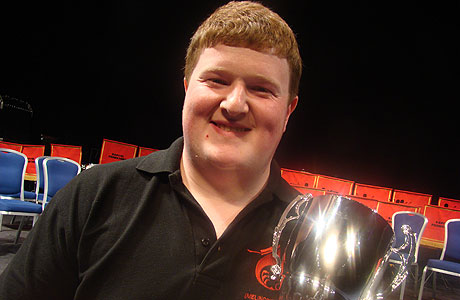
Happy smiles: Best Instrumentalist Award winner: Aled Jones-Pritchard
Innovative encouragement
Talking to at least one Panel member during and after the contest, there was an acknowledgement that perhaps the time had come to try a different musical approach to the particular demands now faced by Fourth Section banding. Innovative encouragement is required.
It was a point any number of MDs we spoke to on the day also highlighted.
Keeping young players happy, motivated and interested on a piece like this was an almost impossible task they said.
The evidence of their opinions was for all to hear on stage on Saturday.
Wonderful achievement
How much more an enjoyable contest this would have been if the MDs could have been confident of allowing their bands the opportunity to show off much more of their talents than just trying to play the notes.
The history books will forever proclaim Melingriffith 2 as the 2011 Fourth Section National Champions – a wonderful achievement for a band that has been in existence less than three years.
Innovative, talented and full of enthusiasm, the brass band movement needs more organisations like them in every region of the country.
Picking pieces such as 'Henry V' will not help.
Dave Tinker

2011 National Championships of Great Britain — Fourth Section retrospective
M2 come out on top in a battle that led to too many casualties in the Fourth Section on Henry V...












